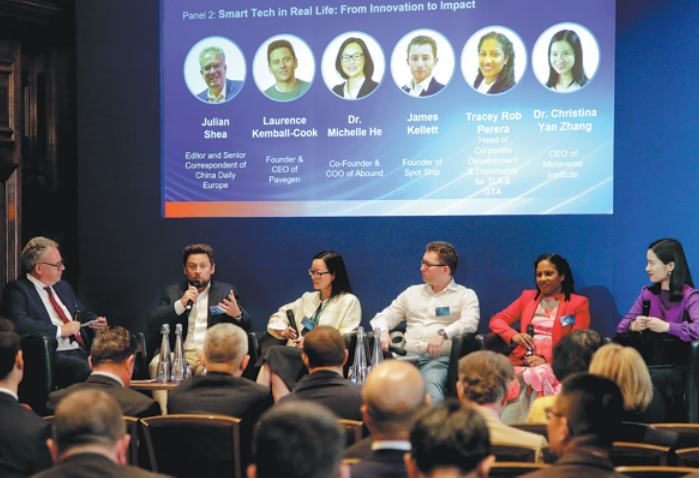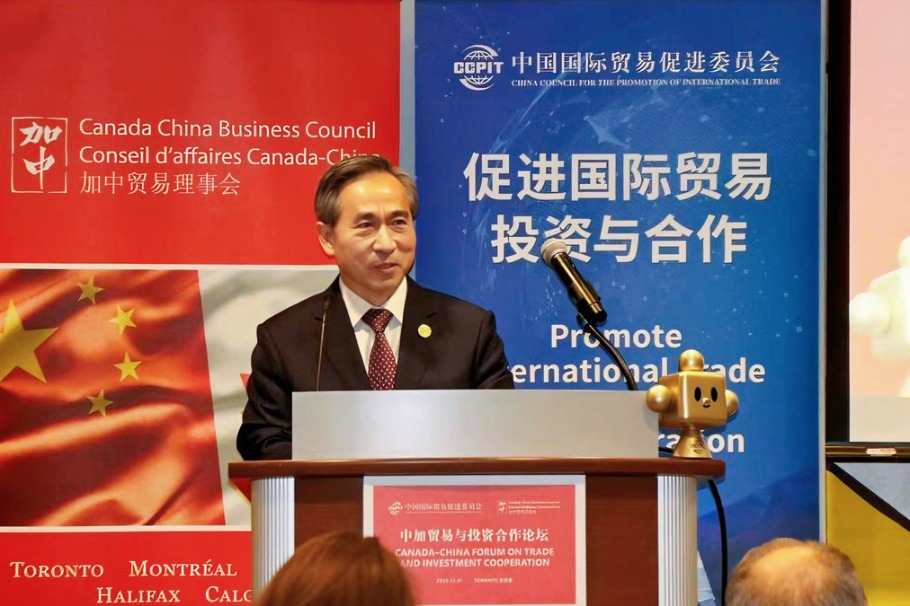China-UK ties in technology emphasized
Forum speakers call for cooperation in AI, clean energy, digital infrastructure


Leaders in artificial intelligence, clean energy, and digital infrastructure gathered in London on Wednesday for the 2025 Sino-UK Entrepreneur Forum, a high-profile event spotlighting innovation and cooperation between the two nations.
Held at the historic One Great George Street in Westminster, the forum, titled "Smart Decisions for Smart Technologies", focused on how emerging technologies are reshaping industries and how cross-border collaboration can support sustainable growth and innovation.
Jointly organized by the 48 Group and China Daily Europe, with support from the Chinese embassy in the UK, the event drew nearly 200 participants, including senior executives, policymakers, academics, and technology professionals.
Chinese Ambassador to the UK Zheng Zeguang addressed the forum, emphasizing the importance of collaboration between China and the UK in the rapidly evolving tech landscape.
He highlighted China's significant progress in AI development, noting that China's AI development is characterized by expanding scale, flourishing innovation, improving computing power, and increasing application empowerment. These elements drive China's transition to a smarter, greener, and more advanced economy, he added.
He also underscored the role of international cooperation in shaping the future of AI. "We must extensively carry out international cooperation on AI, helping Global South countries strengthen their technological capabilities. This is China's contribution to bridging the global intelligence gap," he said.
Additional speakers brought further perspective to the evolving Sino-UK relationship. Jack Perry Jr, chairman of the 48 Group, highlighted the need to approach collaboration not just with ambition, but with clarity.
"Trade today is no longer just about supply and demand," Perry said. He emphasized that rather than seeking capital alone, the UK must offer complementary value. "The UK now attracts more venture capital in AI than any other country in Europe. We're not just experimenting with AI. We are scaling it, commercializing it, and exporting it," he noted.
Reflecting on the evolution of China's global role, Perry Jr added, "China is no longer the underdog. It is confident, capable, and efficient at scale … That is why the UK-China relationship must be built on balance, not dependency, on shared innovation, not one-sided deals."
Sun Shangwu, deputy editor-in-chief of China Daily, who spoke on behalf of China Daily Publisher and Editor-in-Chief Qu Yingpu, acknowledged the UK's early contributions to AI through the pioneering work of Alan Turing and emphasized China's growing strength in this field, driven by national policies, vast digital ecosystems, and diverse real-world application scenarios.
"While AI has seen explosive growth in the past two years, its roots can be traced back to the mid-20th century," Sun said. "Around the world, the AI landscape is blossoming with diversity. The flourishing of various models and applications proves that open collaboration is not just an ideal — they are the smart decision for the development of these smart technologies."
Timothy Hailes, managing director of Meridian Global Strategies, delivered a speech highlighting the deep historical and modern connections between the UK and China, emphasizing the importance of fostering partnerships for mutual progress.
He stressed the importance of internationalism in today's challenging world, where global cooperation is vital for prosperity. "History has proven time after time that we are more prosperous when we work together," Hailes said.
The forum featured two panel discussions.
The first session, "Smart Systems for a Smart World", explored the infrastructure needed for intelligent technologies.
When asked whether smaller, faster companies can outpace the giants, Su Hong, director of industries at Alibaba Cloud (UK, Ireland, and Nordics), said: "Smaller companies can still lead in specific industries, like translation. From our perspective, we're committed to long-term investments in AI and cloud infrastructure, with 380 billion yuan ($52.73 billion) slated for the next three years. With this level of investment, we believe we can maintain our leadership position in the industry."
Bono Ge, UK and Ireland country manager of BYD, praised the UK as an open market for Chinese automakers. Unlike the EU, which imposed tariffs on Chinese carmakers, the UK government chose not to, a decision he described as "brave" and the right approach. He recalled that when BYD entered the market in 2013, London quickly embraced their electric buses, valuing the technology over any bias.
The second panel, "From Innovation to Impact", focused on the adoption of smart technologies across sectors. Panelists addressed issues such as underfunded innovations, regulatory bottlenecks, and the ethical responsibilities that come with deploying AI in public-facing systems.
Laurence Kemball-Cook, founder& CEO of Pavegen Systems, highlighted a key challenge in developing smart technology, noting: "The short-term challenge is money, mainly due to lack of confidence, but ultimately, it comes down to mindset — particularly in Europe."
In her closing remarks, Rebecca Yang, editor-in-chief of China Daily Europe, emphasized that the forum marks not an end but a beginning of deeper cooperation between the UK and China.
Yang highlighted that responsibility must guide innovation, ensuring that technological progress aligns with societal values and supports sustainable development.
Chen Yuehua and He Xiating contributed to this story.
































